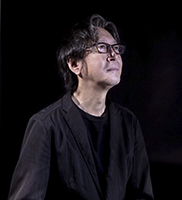No.sfa0046
2021/3/18
- Culture / Sports
Masahiro Miwa announced winner of the 52nd Suntory Music Award for 2020
Download PDF
 |
The Suntory Foundation for the Arts (Directors General: Tsuyoshi Tsutsumi and Shingo Torii) has announced Masahiro Miwa as the recipient of the 52nd (2020) Suntory Music Award, which is presented to individuals or ensembles for notable contributions to the development of Western-style music in Japan.
▽ Selection process
The first round of selections to choose candidates was held on Monday, January 11, 2021 by online. The competition continued with final qualifying round on Thursday, February 25, 2021 by online. After careful consideration, Masahiro Miwa was chosen as the winner of the 52nd (2020) Suntory Music Award, a decision that received the formal agreement of the Board of Directors of the Foundation on Tuesday, March 16, 2021.
▽Prize-money ¥7,000,000
▽The members of the selection committee
Seiji Choki, Atsuya Funaki, Morihide Katayama, Akane Matsudaira, Akio Okada,Miyuki Shiraishi (In alphabetical order)
▽Reason for the award
Masahiro Miwa's creations are a kind of trigger. From the end of the 20th century to today in the 21st, his unique presence in the world of Japanese composition has been revealed in his ability to evoke issues. However, Miwa's works do not only engage one’s thoughts. The essence of his work can be comprehended only if our hearing and sight, and sometimes even our sense of smell and touch, are also mobilized.
It was on the basis of such a style that, in 2020, the composer himself planned and organized the live-streamed event “Masahiro Miwa Festival - Purified Night” (MUSICA CRAS GIFU 2020). With a critical perspective on the phenomena that occurred during the coronavirus pandemic, and adopting a method of live performance without an audience that is only possible because of the coronavirus pandemic, Miwa’s talent reveals itself again in a performance undertaken in collaboration with video director Shinjiro Maeda and poet Shigeru Matsui. In this new work, “A Pentagram for Chickens,” chickens actually walk around the stage while gamelan music is played and artificial voices sing J. Ockeghem’s Requiem accompanied by pipe organ. As the "Spirit World Radio" intercepts the voices of the dead and powder flies through the air, the dance continues while the poems are streamed. As these various performances and movements overlapped and conjoined, the performance took on a ritual-like quality.
The artificial voices and interception of the voices of the dead were devices that connected us to the Other World and fashioned a single imaginary religion in a way that was reminiscent of the ritualistic nature that music once had since ancient times. It neither sought healing in response to the coronavirus pandemic, nor took the optimistic position of a new post-coronavirus lifestyle to come. Rather, it excelled in giving substance to the cynical and radical notion of “a wake for music by music.” The intense worldview revealed by the three-hour-long performance at midnight summed up Miwa's activities to date and made it a worthy recipient of the 52nd Suntory Music Award.
(Miyuki Shiraishi, Committee Member)
▽Biography
Born in Tokyo in 1958, Masahiro Miwa moved to Germany in 1978, where he studied composition under Isang Yun at the Berlin University of the Arts, and from 1985, under Günther Becker at Robert-Schumann Music College.
Since the latter half of the 1980s, Miwa has pursued the potential of composition utilizing computers. He has been particularly prolific in works based on the method known as algorithmic composition.
He has also taken part in collaborative projects with many artists, ranging from an opera with Shinjiro Maeda and artistic pieces with Martin Riches to performances with Nobuyasu Sakonda. His broad array of activities also includes production of CDs and publication of writings.
After graduation, he worked as a composer based in Germany while serving as a part-time instructor at Robert-Schumann Music College and the Academy of Media Arts Cologne. In 1996, he returned to Japan as a founding member of the Institute of Advanced Media Arts and Sciences (IAMAS), where he has been a professor since 2001.
He currently serves as the “big brother” of the Formant Brothers, a creative unit that utilizes synthesized voices. He is also the director of the Japan Federation of Composers, the Japanese Society for Electronic Music, and a member of the Japanese Society for Sonic Arts.
(Awards and Honors, Works)
・The first place at the 14th Concorso Internationale Luigi Russoro, Italy (1992)
“Dithyrambe: for tape”
・The Muramatsu Prize New Artist Award (1995)
・The Akutagawa Award for Music Composition (2004)
“Bolero by Muramatsu gear engine: for orchestra”
・The Golden Nica for Digital Music at the Prix Ars Electronica, Austria (2007)
The Gran Prix in the Digital Music Category with “Reverse Simulation Music”
・Honorable Mention at the Prix Ars Electronica (2008)
In the Hybrid Art Category with “Thinking Machine” (joint composition)
・Honorable Mention in the Prix Ars Electronica (2009)
In the Digital Music Category with “Le Tombeau de Freddie / L’Internationale” (joint composition)
・The 61st Minister of Education Award for Fine Arts (2010)
The publication of “Miwa Masahiro Ongaku Geijutsu Zenshiko 1998-2010”(Artes Publishing, 2010)
・The 17th Keizo Saji Prize (2018)
The performance of “Masahiro Miwa + Shinjiro Maeda, The Monologue Opera “The New Era””
Dec.8, 9, 2017 Aichi Prefectural Art Theater The Mini Theater Dec.16, 2017 The Phoenix Hall
See here for more on the Suntory Music Award
See here about the Suntory Foundation for the Arts
